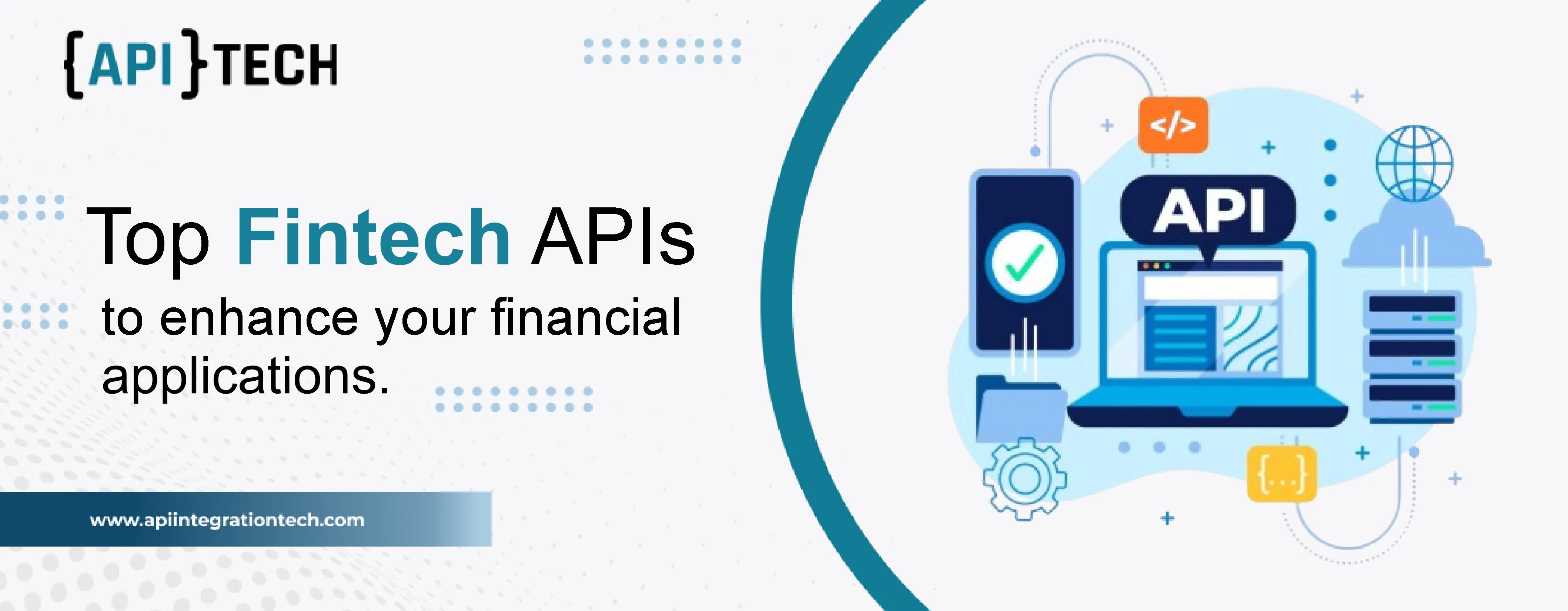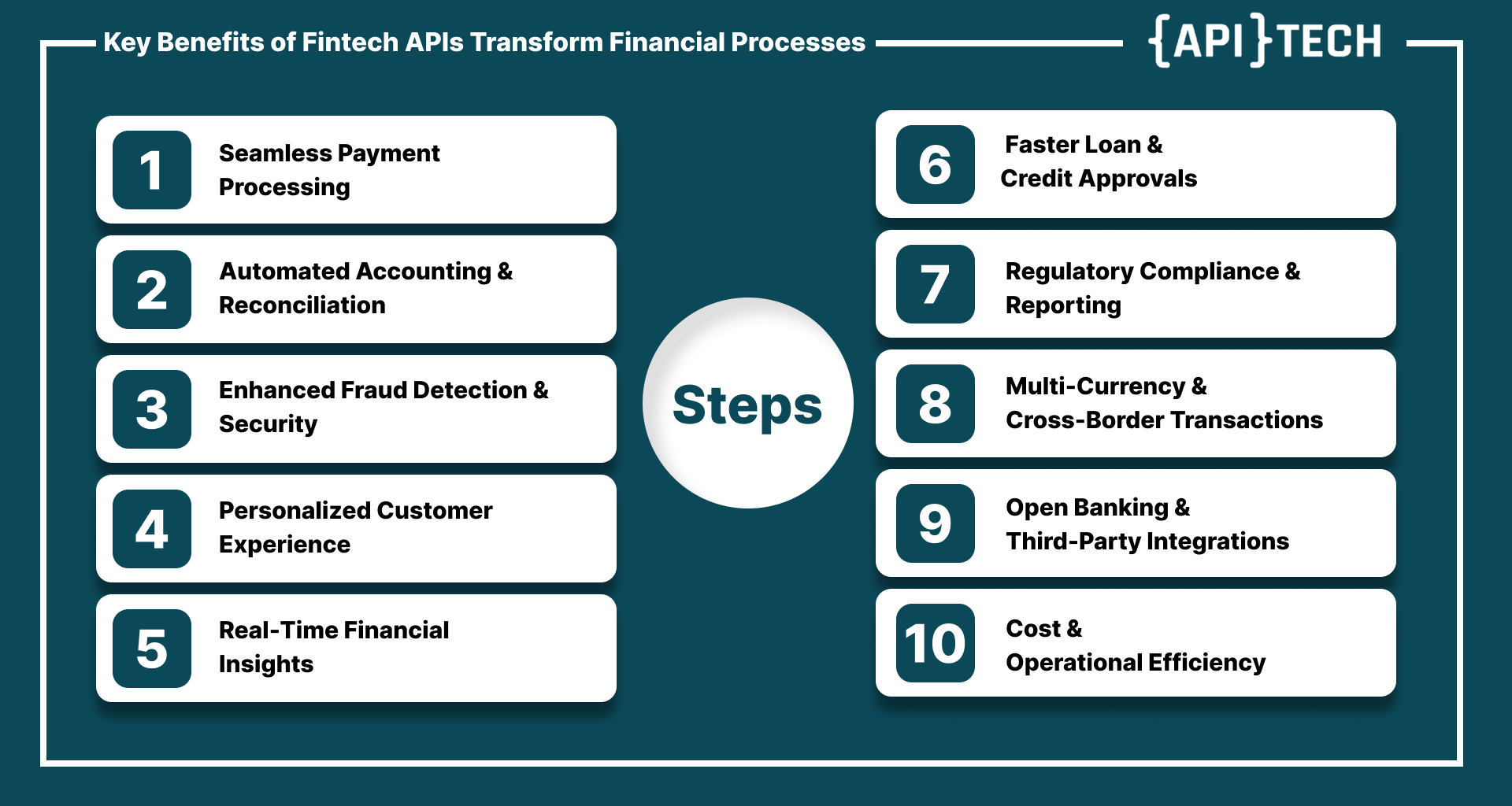If you compare today’s financial technology with the past, you can see a lot has changed. Earlier if you required a simple bank transfer, it could take days. For payment transactions, you have to stay in long queues with paper forms. Now, all these efforts have been eliminated with fintech API development.
These APIs act like digital bridges, connecting different systems smoothly, automating complex tasks, and delivering services in real time. What once took days now happens in seconds. Transactions, identity verification, and even personalized financial advice are delivered instantly, all thanks to these modern fintech APIs. APIs help businesses with modernized technology and offer convenience and security to the customers what they demand in today’s digital world.
In this blog, we’ll learn some of the top fintech APIs that can take your financial application to another level. Whether you want to access actual banking data, enhance security through identity verification, simplify the payment processes, or make the right investing decision, the appropriate API can make all the difference. By exploring the API benefits for financial services of these tools, you'll be in a better position to choose the one that will boost your financial services and keep you ahead of the competition.
Mange your accounting data effectively with Zoho Books API integration services
Top Financial APIs that Improve your Financial Processes
Given below are the Best financial APIs that improve processes, provide better, and more secure experience to the users.
1. Payment Processing APIs
Payment processing is an important aspect of any financial application, and APIs like PayPal and Stripe are selected options because they provide secure, dependable, and easy-to-combine solutions. Stripe is well-known for its developer-friendly tools and large documentation, making it simple for businesses to combine and personalize their payment systems. On the other hand, PayPal is widely trusted and recognized by users, which can boost customer confidence during transactions.
- These APIs help businesses simplify payment processes, reduce transaction times, and provide multiple payment options to users.
- Features like one-click payments, repeated billing, and support for multiple currencies, Stripe and PayPal make it easy to serve a global audience while guaranteeing smooth and secure payment experiences.
- Both APIs are prepared with strong fraud detection tools, helping you protect your business and your customers from fraudulent activities.
2. Banking and Financial Data APIs
For applications that require real-time access to banking data APIs like Plaid and Yodlee are helpful. Plaid, for example, allows your app to connect to users' bank accounts to recover account balances, account statements, and other financial information. This real-time access allows fintech apps to provide features like financial planning tools, financial insights, and automated savings programs, giving your users more value and improving their overall experience.
- Yodlee provides similar functionality but also offers additional features like personalized insights and financial guidance scoring.
- By combining these APIs, you can create a more complete suite of tools that helps users manage their finances more successfully.
- The ability to access and analyze actual financial data not only improves the authenticity of financial advice but also encourages users to make informed decisions quickly.
3. Investment and Wealth Management APIs
If your app involves managing investment APIs like Alpaca and Robinhood are top choices. Alpaca is a commission-free trading API that allows developers to create custom trading strategies or integrate trading features into existing apps smoothly.
Robinhood makes accessing financial markets easy, offering an API to insert trading features right into your app. With Robinhood’s API, users can buy and sell stocks, ETFs, and cryptocurrencies without paying commission fees, while also managing orders, monitoring portfolios, and accessing real-time market data—all within one platform.
Simplify your accounting complexities with QuickBooks API integration services
4. Identity Verification and Fraud Prevention APIs
Fintech apps need to build trust, and APIs like Trulioo and Jumio help you achieve that.
Trulioo’s global identity verification API makes it easy to verify customers according to KYC and AML regulations, guaranteeing conformity and fraud protection.
Jumio, another top provider, uses AI and biometric technology to provide complete identity verification services. By integrating these APIs, you strengthen security, prevent fraud, and secure only legitimate user's access to sensitive financial information, giving your customers peace of mind.
5. Lending and Credit Scoring APIs
APIs like Experian and FICO are important for businesses that are involved in lending or credit evaluation. With Experian’s API, you can access detailed credit reports and scores, helping you make informed decisions on loans, credit score limits, and interest rates, while also using its fraud detection tools to protect against high-risk borrowers.
FICO’s API allows you to easily integrate trusted FICO scores into your loan applications, providing instant access to credit scores and other critical data for fast, authentic assessments. By using these APIs, you can reduce default rates, simplify lending processes, and improve the overall productivity of your lending operations.
How to Choose the Right Fintech API for Your Business?
Choosing the right API for your application involves considering several major factors. First, evaluate the costs, including initial integration fees and continuous usage charges—some APIs charge based on API calls, while others follow a subscription model.
It’s important to select an API that meets your requirements in terms of features, authenticity, and affordability. Also, ensure the API integrates smoothly with your current systems; if it requires major changes or is difficult to implement, it may not be the best fit. Support and documentation are crucial—look for an API provider that provides strong support, tutorials, and responsive customer service. Lastly, consider how well the API will scale with your business as your needs change, and ensure it can grow with you.
Update your financial processes with our custom ClearBooks API integration services
Case Studies and Success Stories
Many businesses have successfully integrated fintech APIs to improve their services, and you can too!
For example, companies using payment processing APIs like Stripe have seen faster transaction times, reduced processing costs, and happier customers. One growing e-commerce platform integrated Stripe to handle global transactions, using its payment options and fraud prevention tools to expand into new markets while maintaining a smooth payment experience for customers.
Similarly, those using identity verification APIs like Trulioo have significantly reduced fraud cases, boosting trust and credibility. A fintech startup integrated Trulioo into its employment process, allowing it to quickly verify user identities, reduce the risk of fraud, and ensure conformity with regulations—all while speeding up the user's employment experience.
Conclusion
Integrating the right fintech APIs can change your financial app, making it more productive, secure, and user-friendly. Whether you’re processing payments, managing investments, or identity verification, there’s just one API that suits your needs. By choosing and implementing these tools carefully, you’ll stay ahead of the competition and deliver exceptional service to your customers.
Are you looking to integrate custom APIs for your Fintech business? Connect with APITech and get your work done. APITech has expert developers who can assist you with Fintech API integration services to make your processes smooth and efficient.
Fintech APIs for Financial applications - FAQs
1. What is the importance of Fintech APIs
Here is the main importance of Fintech APIs
- Fintech APIs allow easy integration of features like payment processing, banking data access, and identity verification into your app.
- They help you quickly adapt to market changes, providing innovative services and meeting customer demands efficiently.
- Fintech APIs improve user experience by providing smooth and dependable functionality across multiple financial services.
2. What are the benefits of integrating APIs into financial services?
Here are the main benefits of Fintech API integration services:
- Automates tasks and reduces errors
- Provides real-time data access
- Lowers development costs
- Improves security and compliance
- Scales with business growth
- Improves user experience
- Allows faster innovation
3. How do Financial APIs offer better user experience?
By integrating Financial APIs, you can offer a smooth and upgraded experience. APIs simplify tasks, allowing users to easily access important features like real-time bank statements, transaction histories, and financial insights all in one place.
This smooth integration not only improves customer satisfaction but also increases user engagement. Additionally, APIs allow personalized services, such as customized investment recommendations based on user data, helping your business stand out and build stronger customer relationships.
4. How do Fintech APIs manage scalability?
Fintech APIs help businesses scale by allowing them to add new features without completely changing their existing systems. This makes it easy to respond to higher demand and improve services, like adding different payment options.
APIs also support expansion into new markets by handling various currencies and payment methods. This way, businesses can reach more customers while keeping their services dependable. Overall, APIs make it simpler to grow and adapt in the dynamic financial industry.




